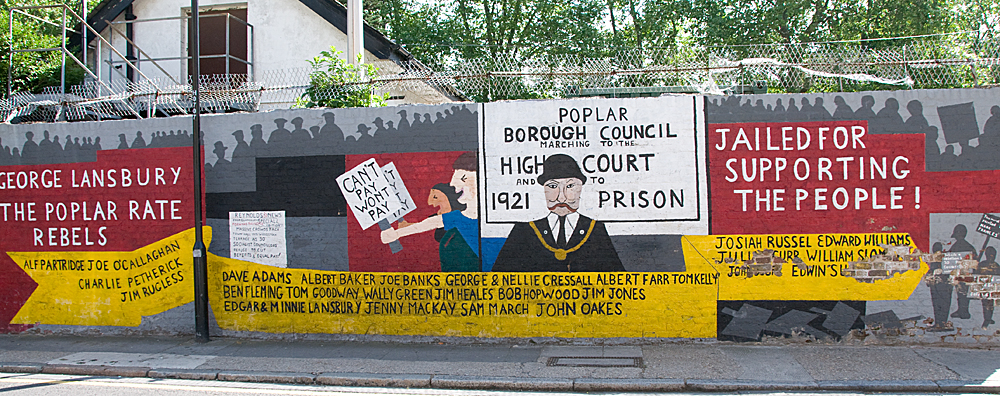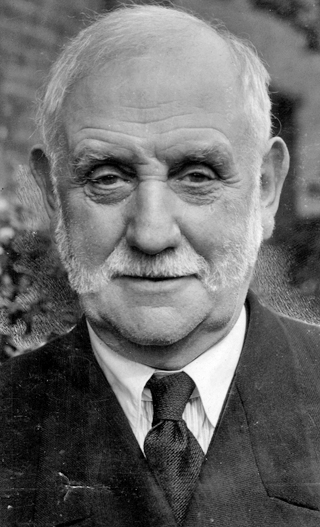|
|||
| BACK |

GEORGE LANSBURY George Lansbury was born in Suffolk, the son of a railway construction employee who travelled from place to place before finally settling in London's East End when George was aged nine. From then on the East End, and more particularly Bow, became Lansbury's home, and from his experience of hardship - he was one of nine children - he was determined to alleviate poverty and improve opportunities for working people. Peace, however, was his earliest love, and at the age of 11 he silenced his elders with concern over the Franco-Prussian War. In 1900 he braved the jingoist patriotism of the Boer War to stand in the 'khaki' election as a socialist, denouncing the war as wicked. Eventually elected as MP for his beloved Bow ten years later, he raised in the House of Commons the prosecution of the authors of a 'Don't Shoot' leaflet addressed to soldiers called to deal with militant strikers. Lansbury also involved himself in the women's suffrage movement, and in 1912 resigned his seat to stand as a 'Votes for Women' candidate, but lost. Campaigning on the same issue, he refused to be bound over to 'keep the peace' and was sentenced to six months imprisonment, part of which was was remitted after he went on hunger strike. He began work on the Labour newspaper, the Daily Herald, becoming editor in time to publish the headline 'War is Hell' on the outbreak of the First World War. The most significant paper of opposition to the war, and of pacifism and conscientious objection, the Herald said at the end of the war that it could think of nothing but that the war was over. Lansbury was also involved in local politics, serving a term as Mayor of Poplar, and in 1921 took a leading part in a revolt against levying rates from the poor of the borough effectively to subsidise the rich elsewhere. The Council answered a summons to the High Court with a procession from Bow led by the official mace-bearer, to the accompaniment of a band and a banner proclaiming, 'Poplar Borough Council marching to the High Court and possibly to prison'. Thirty councillors, including Lansbury, in due course went to Brixton Prison for 'contempt' in refusing a court order to levy the rate. Crowds regularly gathered outside, whom Lansbury addressed through the bars. Neighbouring councils threatened to take similar action. Eventually public opinion swayed the Court to order the Councillors' release, whilst a bill was rushed through Parliament equalising rate burdens between rich and poor boroughs. The ex-prisoner soon regained the Bow Parliamentary seat, which he retained to the end of his life. In 1929 he became a member of the second Labour government, and as the most senior surviving minister after the electoral defeat of 1931 he became Leader of the Labour Party and Leader of the Opposition. Public Pacifist Number One' One of the few politicians ever formally to move withholding all money from the armed forces, and thereby to abolish them, Lansbury embarked on an arduous series of visits, under the name Embassies of Reconciliation, in which he talked not only to the heads of almost every democratic government in Europe, but also to the more autocratic heads of state in the Balkans and to the dictators Hitler and Mussolini. He went to President Roosevelt in the USA. He never gave up hope that by talking to each other, ideally in a formal conference, the world's leaders could avert war. Though this was not to be, his influence did secure the release of a few political prisoners in the totalitarian states. George Lansbury served as Chair of the No More War Movement, President of the War Resisters International and to the child refugees rescued from war-torn Spain and the coming holocaust in central Europe he was 'Grandfather George'. Dick Sheppard, founder of the Peace Pledge Union, of which Lansbury was President at the time of his death, called him 'Public Pacifist Number One'. |
|
|
Peace Pledge Union, 1 Peace Passage, London N7 0BT. Tel +44 (0)20 7424 9444 contact | where to find us |

